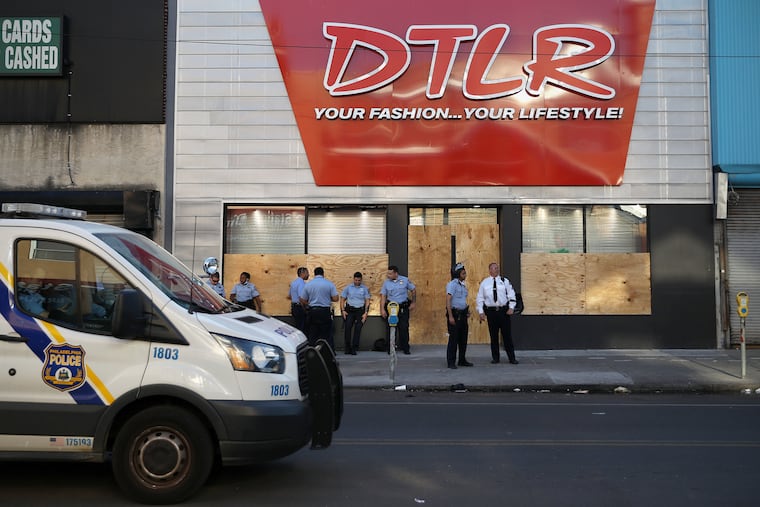This is how small businesses affected by looting can get the insurance money they deserve
"Don’t wait to make your claim because you don’t have all of the information on the loss,” advises one expert.

The looting in Philadelphia and its suburbs recently caused millions of dollars of damage to both large and small businesses. But there’s a bit of good news in all the devastation: Unlike the frustrations they’ve faced getting insurance coverage related to the forced COVID-19 shutdowns, most small businesses will find that the losses to their property are covered — and there may be compensation for loss of income, too.
That’s the word from the insurance industry, and it couldn’t have come at a better time for those businesses most affected. According to the American Property Casualty Insurance Association, the unrest and looting are known as “named perils” in most property policies and even if for some reason that language is excluded, the events are generally part of most “all-risk” policies. While the looting that occurred was traumatic for many Philadelphia small-business owners, it’s just another day at the office for people in the insurance industry. They have seen this stuff before — and then some.
“Civil commotion and rioting losses are typically modest when compared to hurricanes and other natural disasters,” said Brian McCollum, president of McCollum Insurance Agency, with offices in Manayunk and Newtown Square. “Generally speaking, commercial policies do provide coverage for direct physical damage to property caused by riots or civil commotion, subject to other terms and conditions of the policy.”
In addition to property damage, and unlike the shutdowns incurred due to the COVID-19 crisis, small businesses that were affected by the looting — many that were partially reopened or preparing to reopen — may also be entitled to insurance funds for business interruption and loss of income as long as they suffered direct damages.
If you're one of those businesses, what do you need to do to get what's due?
The first thing is to contact your insurance agent and get the process going immediately. Also, ensure that an official police report has been filed that documents the cause of the damage. Get a copy of your original insurance policy and read it carefully so that you’re up to speed on the details.
Your insurance company will send an adjuster to your premises. This usually takes a day or two, so, other than basic cleanup, try to leave the premises as is so that the adjuster gets a complete picture of the damage. Speaking of pictures, take many, as well as videos. These are critical forms of documentation. Your adjuster may also ask for other paperwork to support the cost of the items that were damaged or stolen.
“Don’t wait to make your claim because you don’t have all of the information on the loss,” advised Kim Winter, a partner and insurance recovery practice group leader at national law firm Lathrop GPM. “Make your claim and you can always gather more information as needed.” Winter says that for some claims, a forensic accountant may also get involved. In order to maximize your claim, you can expect that you will need to supply as much documentation as possible, and that’s going to take a lot of work.
“For every item I’m missing, I have to supply an invoice. That could be real tough,” Bob Hart, the owner of Al’s Sporting Goods in Wilmington, a 17,000-square-foot shop that saw property damage and the loss of 10,000 pairs of shoes as a result of looting, told the Insurance Journal. “You just got to try to work through it.”
If you’re going to make a claim for business interruption, be prepared to show your books and records. You’ll need to calculate how much income you lost that was directly related to the looting, and not because of the pandemic. Even if your store or restaurant had limited operations, the stoppage of those activities that were directly caused by looting is likely covered. Your job is to show the revenues and expenses you’ve been incurring for those operations and then a reasonable projection of the profits that you would have earned if the looting had not occurred. “It depends on your specific policy,” said Winter who also says to aggressively fight any objection that an insurance company may raise. “I’d caution policy holders not to take ‘no’ for an answer without diving into the policy language and talking to experienced coverage counsel.”
How much time does it take to get reimbursed? This varies on the company, the number of claims, the availability of adjusters, and the complexity of the claim submitted. It could take a week or a month. Property claims generally process faster than business interruption claims. You may get an advanced payment, but you may have to wait for full compensation. If you need funds sooner, consider short-term financing from a bank or an online lender such as PayPal, Square, QuickBooks Capital or OnDeck. The interest rates could be significant (particularly if you use an online lender) but in many cases even those costs would be covered by your policy.
Although Winter says it could take “significant time” to get payment, particularly with business interruption losses and COVID-19 complications, McCollum is more optimistic. “If the facts are clear and you are available to respond and cooperate with the insurance company, claims can be settled within days,” he said.
Correction: This story has been changed to correct the job held by Kim Winter.